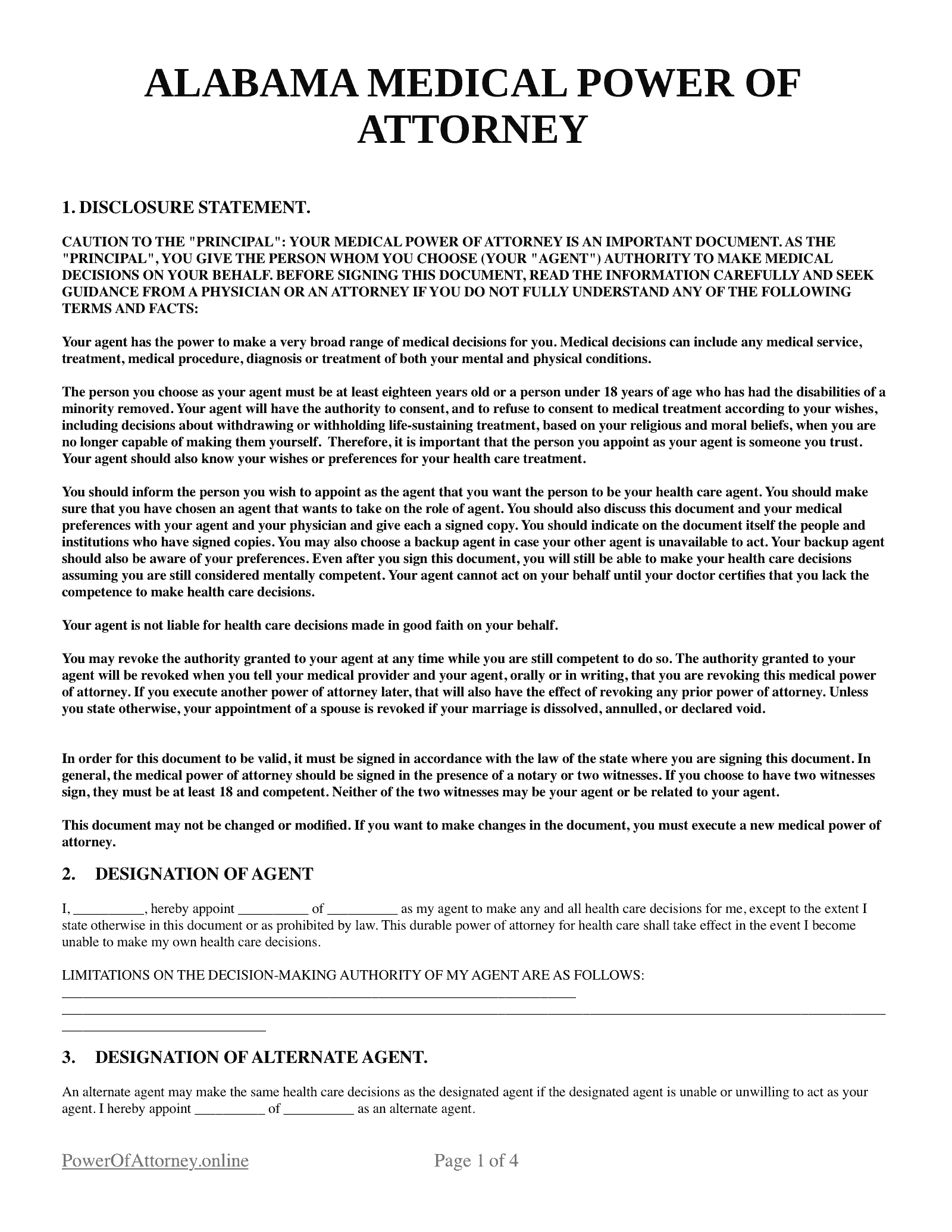Free Alabama Medical Power of Attorney Forms
A medical power of attorney (POA) is a document that allows a person with a medical condition to appoint someone to make healthcare decisions on their behalf. The goal is to ensure a patient’s medical journey is not disrupted even if they become incapacitated and are unable to make decisions for themselves.

Alabama Medical Power of Attorney Laws
- Advance Directive for Health Care - The law states that any competent adult can appoint another to be their healthcare proxy through a written directive that becomes effective when the patient suffers a terminal illness or injury, or is in a “state of permanent unconsciousness” (Code of Alabama §22-8A-4).
- Filing and Recording of Living Will - For this purpose, “living will” refers to the medical POA or directive for healthcare. The person may have the document filed or recorded in the county office of the judge probate in Alabama and pay the $5 fee and other corresponding recording fees. “A living will recorded pursuant to this section shall not be open for general public inspection, but shall be available for inspection and copying at the request of emergency medical personnel, hospital personnel, treating physicians, members of the immediate family, a person with a power of attorney or other legally authorized person, or a person authorized in writing by the maker of the living will” (Code of Alabama §22-8A-14).
Signing Requirements in Alabama
The person granting permission for the healthcare proxy or agent must sign the Alabama medical POA. If they are unable to do so, they can ask someone to sign it on their behalf and in their presence. The document must also be witnessed by two adults who are at least 19 years old. Witnesses cannot be the principal, agent, or family members related by blood, adoption, or marriage.
In addition, witnesses cannot have any interest in the principal’s estate by will or natural succession (Code of Alabama §22-8A-4).
According to Alabama laws, notarization isn’t a requirement. However, it is still recommended since it makes the agreement more binding.
How To Write a Medical POA in Alabama
The medical POA provides the agent authority to make medical decisions on behalf of the principal. Here are the steps to making one:
1. Talk to the Prospective Agent
The principal must talk to the person they intend to appoint as a healthcare proxy or agent. The role is important as it pertains to the health of a person. It is also a sensitive one as the agent may be asked to make difficult decisions, such as the discontinuation of life-sustaining treatment.
There is no rule as to who you can choose as a medical agent. Individuals can elect family members as long as they can shoulder the responsibilities that come with it.
It is also possible to ask more than one healthcare agent to ensure your continuity of care in case the first agent is unavailable.
2. Download the Alabama Medical POA Template
For convenience, download our printable template for an Alabama medical POA, which is the printable form accepted in Alabama. The template will contain the essential details to make the document legal and effective. All you need to do is fill out specific information related to your situation.
3. Specify the Agent’s Powers
The principal or declarant can specify the acts that an agent can do on their behalf. They can choose to limit the agent’s authority to specific procedures or surgeries or give them blanket authority over all medications and other medical treatments. You can make the document as detailed and lengthy as you need to so that it contains all the essential points for your medical care.
4. Discuss Compensation
Most agents are paid for assuming the role, even if they are close family members. In addition, agents can be reimbursed for their travel, lodging, and food when carrying out their responsibilities.
5. Sign the Alabama Medical Power of Attorney Form
If the principal is incompetent and cannot physically sign the document, they can appoint somebody to sign on their behalf and with their consent. Two adults, who are at least 19 years old, must witness the signing of the document. The healthcare proxy and the principal cannot be witnesses.
6. Use the Document
After signing, the principal and agent must keep copies of the document. When the time comes, they can provide copies to their doctor. The agent can also present their copy of the POA when they have to make medical decisions on the principal’s behalf.